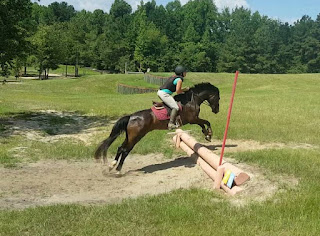Given the choice of fight or flight, horses choose flight almost every time.
What we perceive as spookiness is actually the result of millions of years of evolutionary conditioning urging a horse to flee from danger. The horse who doesn't spook and run away is the one who gets eaten by the mountain lion.
It isn't possible to completely train this behavior out of a horse. Even the oldest, calmest, most bomb proof lesson pony is going to spook now and then.
In short, a horse can be thought of as a 1000 lb. deer.
With all this in mind, here are eight things you can do to be an educated spectator and help keep riders and horses safe:
1. Set up ringside tables and tents prior to the morning schooling so all horses have a chance to see them before the show starts. Stake your tents into the ground so they don't flip over if a big gust of wind comes along.
2. Secure all loose materials such as banners, tablecloths, paper plates, and plastic bags. Make sure nothing is flapping in the wind. Keep checking throughout the day to make sure everything stays put.
3. Avoid sudden movements ringside when a rider is on course or a flat class is in progress. Children running/playing right outside the ring or the opening of an umbrella can trigger a spook. Move slowly and quietly. If your show facility has metal bleachers, walk quietly or wait until the ring is vacant between classes to move to/from your seat.
4. Unless you are a coach, rider, or horse holder, stay out of the horse holding area. Large groups of people can make horses nervous, and if the area is too crowded a spooked horse can injure people standing nearby.
5. If the announcer asks the crowd to hold their applause for a certain horse, please comply. If the horse provider thinks the issue is important enough to notify the steward, who then notified the announcer, it is not a request to be taken lightly.
6. If a horse spooks and begins running away with a rider in the arena, please stay in your seat, stay quiet, and stay calm. Horses pick up on the energy of the crowd. The horse is already scared, and reactivity from the crowd can make it worse. The best way for you to help is to stay seated and allow the professionals to handle the situation.
7. As the end of the show approaches, avoid packing up your tent, tables, chairs, etc. while a class is in process. The classes at the end of the show tend to be lower level (novice and beginner) with less experienced riders that may not have the skills yet to handle a big spook. Also, these riders have been waiting around all day for their time to shine. Be respectful of all the hard work they've put into their preparation and give them the opportunity to do their best.
8. If you see something, say something. A child rolling down the grass hill next to the ring, a loose tablecloth next to the concession stand, or a sweet grandmother about to open her umbrella can all create a dangerous situation, but you as an educated spectator can play an important roll in keeping our kids and horses safe.
Amanda Garner is an Interscholastic Equestrian Association (IEA), Intercollegiate Horse Show Association (IHSA), and Georgia Hunter Jumper Association (GHJA) steward, schooling show judge, and the owner of Epiphany Farm, LLC in Dahlonega, Georgia. She is also a member of the IEA Board of Directors, chair of the IEA's National Education Committee, and the author of "A Parent's Guide to the Interscholastic Equestrian Association."
 |
| By being an educated spectator you can help keep riders safe |




















